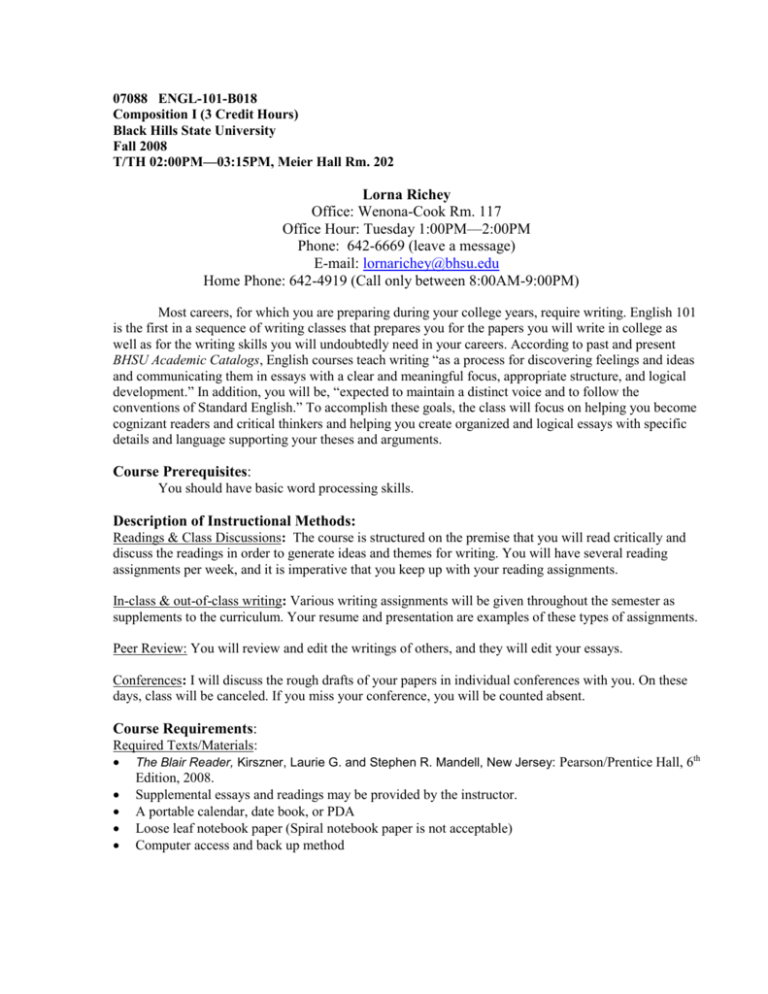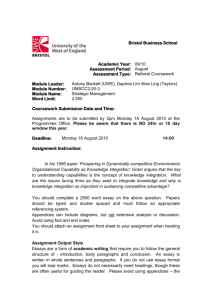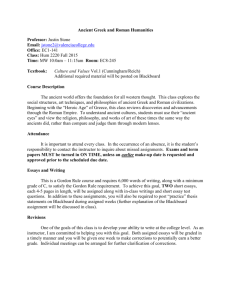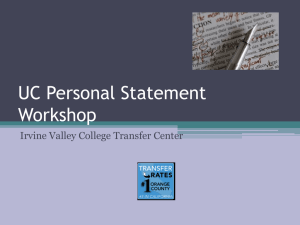
07088 ENGL-101-B018
Composition I (3 Credit Hours)
Black Hills State University
Fall 2008
T/TH 02:00PM—03:15PM, Meier Hall Rm. 202
Lorna Richey
Office: Wenona-Cook Rm. 117
Office Hour: Tuesday 1:00PM—2:00PM
Phone: 642-6669 (leave a message)
E-mail: lornarichey@bhsu.edu
Home Phone: 642-4919 (Call only between 8:00AM-9:00PM)
Most careers, for which you are preparing during your college years, require writing. English 101
is the first in a sequence of writing classes that prepares you for the papers you will write in college as
well as for the writing skills you will undoubtedly need in your careers. According to past and present
BHSU Academic Catalogs, English courses teach writing “as a process for discovering feelings and ideas
and communicating them in essays with a clear and meaningful focus, appropriate structure, and logical
development.” In addition, you will be, “expected to maintain a distinct voice and to follow the
conventions of Standard English.” To accomplish these goals, the class will focus on helping you become
cognizant readers and critical thinkers and helping you create organized and logical essays with specific
details and language supporting your theses and arguments.
Course Prerequisites:
You should have basic word processing skills.
Description of Instructional Methods:
Readings & Class Discussions: The course is structured on the premise that you will read critically and
discuss the readings in order to generate ideas and themes for writing. You will have several reading
assignments per week, and it is imperative that you keep up with your reading assignments.
In-class & out-of-class writing: Various writing assignments will be given throughout the semester as
supplements to the curriculum. Your resume and presentation are examples of these types of assignments.
Peer Review: You will review and edit the writings of others, and they will edit your essays.
Conferences: I will discuss the rough drafts of your papers in individual conferences with you. On these
days, class will be canceled. If you miss your conference, you will be counted absent.
Course Requirements:
Required Texts/Materials:
The Blair Reader, Kirszner, Laurie G. and Stephen R. Mandell, New Jersey: Pearson/Prentice Hall, 6th
Edition, 2008.
Supplemental essays and readings may be provided by the instructor.
A portable calendar, date book, or PDA
Loose leaf notebook paper (Spiral notebook paper is not acceptable)
Computer access and back up method
2
Suggested Texts:
The Penguin Handbook 2nd ed. Faigley, Lester, NY: Pearson/Longman, 2006, or another English
Handbook.
Attendance:
In general, enrollment in a class implies the responsibility for attending each class session.
However, the attendance policy for a specific class is at the discretion of the faculty member teaching that
class and will be outlined in the course syllabus. Students will be allowed to make up graded work if an
absence is due to participation in university-sponsored activities, provided prior notification of the
impending absence has been given to the instructor.
In my course, “attendance” means being present, on time, and prepared for the entire class.
Regular class attendance and punctuality are mandatory for classes just as they are in the workplace, and I
will take attendance daily. Discussions and editing sessions are an integral part of this course and active
participation is expected. Absences and tardiness will significantly lower your grade. Late arrivals and
early departures disrupt the class. Students who arrive late, leave early, or miss more than four classes
(whether excused or un-excused) will not pass the course. You are responsible for getting the
assignments if you must miss a class. However, quizzes and in-class assignments cannot be made up.
There is no need to ask permission to leave early nor is there a need to explain absences or late arrivals. I
always assume that you will be in class on time if possible and that if you miss class, you have a valid
reason.
My Attendance:
If I need to cancel class because my car broke down, or I am ill, etc., I will try to call ahead and
have someone post a sign. If possible, I will e-mail you or use D2L to inform you before class. However,
if you come to class and I am not here by the time 15 minutes has elapsed, please assume that class is
canceled.
Essays:
Essays are due at the beginning of the class period they are assigned and should be turned in to me in
person.
All papers should be computer generated and double-spaced using standard margins and 12 point
fonts.
Essays should be saved and “backed up” on disks, CD’s, or USB Flash Drives or other memory
storage devices. You should also keep a hard copy in your own files. Computer failure is not an
excuse for late papers.
Use appropriate headings and MLA format which will be discussed in class.
This is an English class, so spelling, punctuation, grammatical and mechanical errors will count
against your grade.
Each writing assignment has two deadlines—one for peer review and one for the revised draft. If you
miss the peer review, you will lose 25% of that paper grade.
Essays will be turned in using the following order:
1. Final Draft on Top
2. Rough Draft or Drafts with Peer Revisions
3. Outline and Pre-writing
4. Sources (Include photocopies of all sources with the information you quoted highlighted.)
3
Paper Format: The following information should be included at the top of each of your
assignments:
1. Your Name
2. My Name (Spelled correctly, please)
3. Your Class Name and Number
4. Assignment Name or Number (Descriptive Essay or Essay #1)
5. Due Date
Presentations: In addition to sharing thoughts and opinions orally in class, students’ in-class writings and
essays will be shared in small group settings and occasionally with the entire classroom. Furthermore, you
will create an oral presentation on a controversial issue. An instruction sheet will be given to you at a later
date. If you are absent or tardy on the day of your presentation, it may be impossible to make it up.
Revisions: All essays will be edited and revised. Only then will the entire essay be graded.
Makeup Policy: Students are responsible for meeting all deadlines. Absence is not justification for
missing deadlines. Remember, printer problems such as running out of paper or ink, or other technical
difficulties, do not constitute excuses for late work. Papers submitted after the deadline and papers
missing peer review drafts will not receive formal written comments and can only receive a maximum of
65% (D); however, 65% is better than a zero.
Class Communication: Students must arrange with classmates to find out about missed classes,
assignments, and to pick up missed handouts. Together we will be implementing the new D2L (Desire to
Learn) program which will link all students in this class. In this way you will be able to contact other
students to clarify assignments, ask questions, and form study groups, etc. However, some “netiquette”
will apply. Do not send “junk” e-mail such as jokes, chain letters, or other forwards to your classmates or
instructor. Do not use the internet for any purpose other than educational pursuits. Do not constantly email classmates or the instructor for trivial matters. Do feel free to call or contact others with legitimate
questions.
Deportment:
Appropriate behavior and decorum is expected of all students. Therefore, the following will not
be accepted: tardiness, sleeping in class, talking while others are speaking, whispering, inappropriate
language or rudeness, ringing cell phones or text messaging.
“Education is the ability to listen to almost anything without losing your temper or your selfconfidence.”—Robert Frost, American Author. I agree with this sentiment and believe that every student
has a right to voice his or her opinions to a sympathetic and courteous audience; therefore, no hostility
will be allowed in discussions. Furthermore, please do not write about any criminal activity of which you
have personal knowledge—as a witness, victim, or a perpetrator, including underage alcohol
consumption. If you write about such activity, I may be legally required to report it to the authorities.
This class contains adult themes and content; mature reading selections may be discussed.
Plagiarism:
Plagiarism is “presenting another person’s words or ideas as your own” (Holt Handbook 577).
We will discuss plagiarism further in class; however, using more than three words in a row from another
source, or using key terms from another author requires citation with quotation marks and documentation.
In addition, reading and paraphrasing an author’s words still requires documentation. Using a paper
previously written for another class is also considered a violation of academic conduct. Furthermore,
BHSU subscribes to Turnitin.com, a service that detects plagiarism in writing. “Plagiarism is not taken
4
lightly in education, business, or anyplace else. Plagiarism is theft” (Holt Handbook 577). Those who
plagiarize will be reported to the division chair and/or the college dean who will then decide upon the
consequences. Consequences include failing the paper, the course, or even possible expulsion from the
university.
Course Goals:
This course fulfills a system-wide General Education requirement under Goal #1, as follows:
Students will write effectively and responsibly and will understand and interpret the written
expression of others.
Student Learning Outcomes:
As a result of taking this course, students will:
1. Write using standard American English, including correct punctuation, grammar, and sentence
structure;
2. Write logically;
3. Write persuasively, with a variety of rhetorical strategies (e.g. expository, argumentative,
descriptive);
4. Incorporate formal research and documentation into their writing, including research obtained
through modern, technology-based research tools.
Students will write both in-class and out-of-class papers which will be assessed in terms of the outcomes
identified above and according to the “evaluation criteria” section below. Written and/or oral feedback
will be provided to the student regarding the logic and persuasiveness of his or her writing, the use of
standard American English, and the proper and effective use of research and documentation.
Evaluation Procedures:
Assessment Criteria:
The grade of “A” (exceptional) designates that an essay demonstrates
an excellent command of subject matter
a clear explanation and synthesis of ideas
independent thought
thorough and persuasive substantiation of claims
clear and effective organization
precise, correct, and effective usage
correct grammar and punctuation
The grade of “B” (superior) designates that an essay demonstrates
a reasonable command of subject matter
a capacity for explanation and synthesis of ideas, though it is not fully realized
a capacity for independent thought, though it is not fully realized
sufficient substantiation of claims
mostly clear and effective organization
mostly precise, correct, and effective usage
mostly correct grammar and punctuation
The grade of “C” (average) designates that an essay demonstrates
an adequate command of subject matter
some weakness or inconsistency in its explanation and synthesis of ideas
relative absence of independent thought
inconsistent substantiation of claims
5
significant lapses in organization
significant lapses in usage
significant lapses in grammar and punctuation
The grade of “D” (passing) designates that an essay demonstrates
an inadequate command of subject matter
insufficient explanation and synthesis of ideas
unexamined, clichéd thinking
inadequate substantiation of claims
poor, hard-to-follow organization
numerous errors in usage
numerous errors in grammar and punctuation
The grade of “F” (failure) designates that an essay demonstrates
a majority of the qualities of a “D” essay, but to a degree unacceptable in college-level writing
a failure to follow or complete the assignment
Assignments:
Homework Assignments/Quizzes
Participation/Attendance
Turnitin.com
Essay #1: Resume
Essay #2: Illustration & Analysis
Essay #3: Compare & Contrast
Essay #4: Classification, Division, Definition
Essay #5: Cause & Effect
Oral Presentation
Final
25 points
25 points
25 points
50 points
100 points
100 points
100 points
100 points
100 points
100 points
Grading Scale:
A= 90-100
B= 80-89
C= 70-79
D= 60-69
F= 59 and below
Official Accommodation Statement: “Reasonable accommodations, as arranged with the Disabilities
Services Coordinator, will be provided for students with documented disabilities. Contact the BHSU
Disabilities Services Coordinator at 642-6099 (room 022 in the Student Union) for more information.”
Academic Freedom and Responsibility Statement: “Under Board of Regents and University policy student
academic performance may be evaluated solely on an academic basis, not on opinions or conduct in matters
unrelated to academic standards. Students should be free to take reasoned exception to the data or views
offered in any course of study and to reserve judgment about matters of opinion, but they are responsible for
learning the content of any course of study for which they are enrolled. Students who believe that an academic
evaluation reflects prejudiced or capricious consideration of student opinions or conduct unrelated to academic
standards should contact the chair of the department in which the course is being taught to initiate a review of
the evaluation.”
NOTICE: Alterations and amendments to this syllabus may be made as conditions necessitate.









